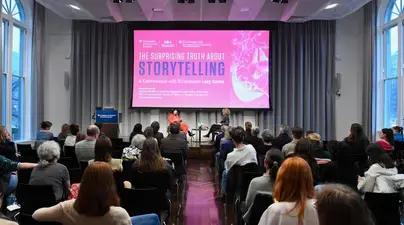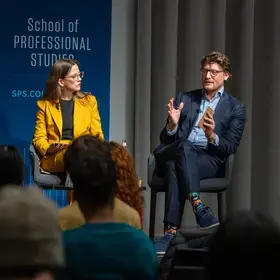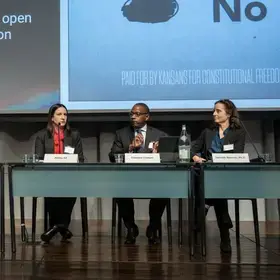A conversation with acclaimed science storyteller Lucy Cooke on April 3 at Columbia’s Pulitzer Hall promised a lively and engaging discussion on the topics of science, satire, sloths, and sex.
And it did not disappoint.
Hosted by the Columbia University School of Professional Studies (SPS) M.S. in Sustainability Management, M.S. in Sustainability Science programs along with Columbia Journalism School’s Science Journalism Program, and CJS Women in Media, “The Surprising Truth about Storytelling” provided insights into the complexities of science writing, morality, and the diversity of behavior observed in nature. The event was moderated by Louise A. Rosen, senior associate dean of administration and communications, Columbia School of Professional Studies and lecturer, School of International and Public Affairs at Columbia University.
It was all filtered through Cooke’s distinctive approach to storytelling, which blends science and humor to illuminate important issues entertainingly.
Cooke's latest book, Bitch: On the Female of the Species, exemplifies her ability to challenge societal norms and provoke conversation through her unique narrative lens. As Cooke put it, “I particularly like telling stories that make people look at the world in a different way and also make people laugh.”
Sloths: Nature’s Unsung Sustainability Heroes
Cooke studied Zoology at New College, Oxford University with renowned scholar Richard Dawkins, before embarking on her career as a storyteller. Taking a break from working as a television producer, Cooke was driven by a mission to save endangered amphibians and shared how an encounter with a sloth inspired a new passion. When an Instagram video she posted featuring sloths went viral, her career took an unexpected turn, and Cooke found herself inadvertently advocating for the furry, tree-dwelling mammals.
Cooke shared that despite their notoriously sedentary lifestyle, sloths are a positive for sustainability. “They are sustainability icons. To me, they are like the perfect story.”
Unlike sloths, Cooke explained, “humans are obsessed with going faster than nature intended, and it’s killing the planet.” This observation underscores her belief in the value of embracing nature’s slower pace, a sentiment echoed in her admiration for the enduring adaptability of sloths.

Science storyteller Lucy Cooke (left) in conversation with moderator Louise A. Rosen at Columbia's Pulitzer Hall.
Cultural Reflections and Animal Behavior
Throughout the conversation, Cooke delved into the intricacies of human-animal parallels, noting how society often superimposes its values onto animals. This dynamic serves as fertile ground for storytelling, allowing Cooke to dissect human behavior through the lens of the animal kingdom.
“We sort of impose our culture and our ideas on animals, and then use that to reflect back on ourselves,” said Cooke. This introspective approach adds depth to her storytelling, prompting audiences to reconsider their preconceived notions.
She succinctly summarized her views on the diversity of behavior and complexities of morality observed in nature: “The animal kingdom is the worst place to go for model moral guidance.”
Breaking Boundaries through Humor in Science
Cooke’s approach to storytelling transcends conventional norms, infusing humor into personal narratives to inspire, engage, and educate audiences that traditionally may not gravitate toward science storytelling.
Addressing concerns about maintaining scientific integrity while using humor, she emphasized the importance of crafting narratives that challenge perceptions. “I particularly like telling stories that make people look at the world in a different way and also make people laugh,” Cooke said.
Cooke navigates complex topics with finesse by employing humor as a tool for change. “I'd love to try to dress it up as something really clever and intentional,” she shared. “But basically, I just really like telling jokes. I just like making people laugh.”
Lessons Learned from Nature’s Misfits
As the event drew to a close, Cooke’s eclectic blend of science, satire, and storytelling left attendees inspired and entertained. Through her humor-infused narratives about sloths, amphibians, and other animals, and insightful reflections on human-animal dynamics, Cooke demonstrated the transformative power of storytelling to spark curiosity and embrace new ideas.
As attendees left the talk, they carried with them not only newfound insights but also a deeper appreciation for the art of storytelling in science.
About the Sustainability Management Program
The Columbia University M.S. in Sustainability Management program offered by the School of Professional Studies in partnership with the Climate School provides students cutting-edge policy and management tools they can use to help public and private organizations and governments address environmental impacts and risks, pollution control, and remediation to achieve sustainability. The program is customized for working professionals and is offered as both a full- and part-time course of study.
About the Sustainability Science Program
The Master of Science in Sustainability Science prepares students for management and leadership positions in which they help organizations address environmental impacts. Students learn strategies to respond to the ever-changing environment and predict future environmental changes—and the impact on the public.


